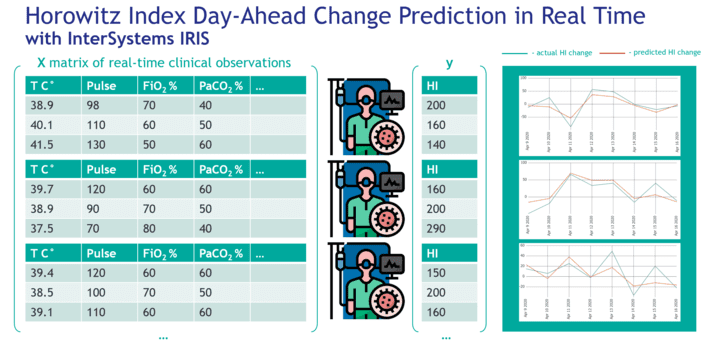Rationalizing the effort of our intensive care staff by predicting patient condition indicators in real time is a challenge because of an impressive number of externally imposed and internally unavoidable restrictions. Patient data privacy requirements, variety of types and lack of standardization within one type of equipment, limited availability of “pure” examples of this or that patient condition patterns – just to name a few complexity factors.
Computational approaches to model patient condition are not an issue most of the times, it is their ability to function in real-time clinical setup that may become an issue. In the reality, we will need a platform to handle several parallel tasks in real time:
- Preparation, cleansing, and normalization of the measurement streams coming from medical equipment
- Building “on the go” of relevant training datasets while respecting patient data privacy and storage constraints (frequently, distributed storage is a requirement)
- Applying of a set of very different modeling pipelines – all at once and re-using the outputs of each other as inputs
- Visualization and notification in near real time addressed to an audience consisting of various user roles (whose priorities and decision-making preferences constantly evolve)
Assessing at each point in time our patients’ condition and prioritizing the involvement of our intensive care staff based on patient condition prediction, if delivered at scale, can lead to tangible increase in saved lives and cost savings.

InterSystems IRIS is reputed for its ability to deliver a tight bundle of data, integration, and computation components to cope with automation and decision making in a real-time setup. Likely beneficiaries of InterSystems IRIS strengths are businesses with intensive data flows originating from various sources requiring near-real-time transformations and decision making based on scientific computations. Orchestration by InterSystems IRIS of some most widely used mathematical modeling environments (Python, R, Julia as well as some proprietary frameworks) coupled with its extremely flexible process automation and data ingestion capabilities, makes it an interesting choice.
InterSystems IRIS makes no difference among modeling providers installed locally or consumed from the cloud: both types can be included on the automation process, and the use of both types can be triggered in such a way that only economically feasible computations are performed. Moreover, InterSystems IRIS makes practically no difference (in terms of available functionality) among on-premise and cloud deployment, securing investment in the solutions developed and functioning on InterSystems IRIS as a platform regardless of changes in deployment approaches over time.
We invite the data science experts that are involved in production-level automation of machine learning and artificial intelligence mechanisms to visit the public repository that contains links to resources that allow test-driving InterSystems IRIS and its AI/ML automation features free of charge and without time limits.

